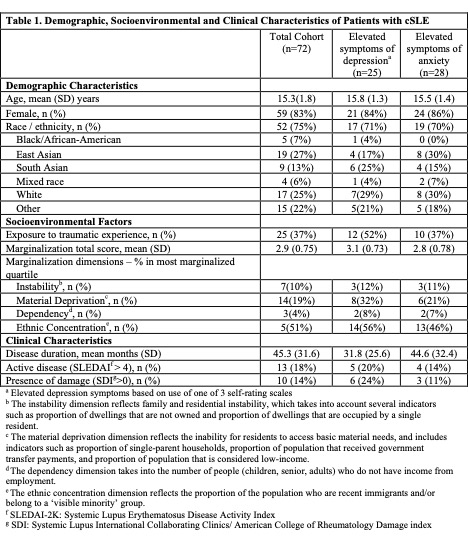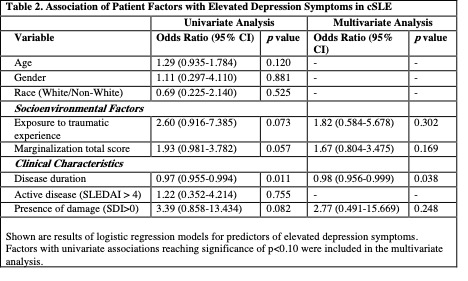Session Information
Date: Sunday, November 7, 2021
Title: Pediatric Rheumatology – Clinical Poster II: SLE, JDM, & Juvenile Scleroderma (0764–0785)
Session Type: Poster Session B
Session Time: 8:30AM-10:30AM
Background/Purpose: Depression and anxiety symptoms are prevalent in youth with childhood-onset system lupus erythematosus (cSLE). Healthcare disparities and trauma are associated with adverse mental health in adults with SLE. There is limited data on how these socioenvironmental factors impact mental health for children and adolescents with cSLE. We examined the association of socioenvironmental and disease-related factors with symptoms of depression and anxiety in a pediatric cSLE sample.
Methods: We examined a cross-sectional pediatric sample ages 9-17 years from a major tertiary hospital SLE outpatient clinic between August 2017 and April 2021. All patients met ACR or SLICC classification criteria for SLE. Self-report screening questionnaires for depression (one of: Center for Epidemiologic Studies Depression Scale for Children, Beck’s Depression Inventory, Child Depression Inventory), and anxiety (the Screen for Childhood and Anxiety Related Disorders) were used to investigate current symptoms. Elevated depression/anxiety symptoms were determined based on established clinical cut-points. The Kiddie-Schedule for Affective Disorders and Schizophrenia (Version 5) interview recorded history of exposure to a traumatic event. Disease activity was measured by SLEDAI-2K and damage by the SLICC Damage Index (SDI). Area-level indicators of socioenvironmental disadvantage were obtained using the Ontario Marginalization Index. The association between elevated depression and anxiety symptoms (binary outcomes), and disease-related (duration, activity, damage) and socioenvironmental (traumatic exposure, marginalization) factors were examined using univariate and multivariate logistic regression analyses.
Results: 72 youth (mean age 15.3 ± SD 1.8 years, 83% female, 75% self-identified as non-white) were included (Table 1). The mean ± SD disease duration was 46.3 ± 32.6 months. 18% had active disease (SLEDAI-2K > 4), and 14% had disease damage (SDI >0). History of traumatic exposure (e.g., witness of domestic violence) was present in 37%. The mean marginalization total score was 2.9 (range 1-5 with higher values reflecting greater marginalization). Elevated depression symptoms were present in 37% (n=25) and anxiety in 39% (n=28). In univariate analysis (Table 2), elevated depression symptoms were associated with shorter disease duration (OR=0.97, p=.011), presence of disease damage (OR=3.39, p=0.082), traumatic exposure (OR=2.60, p=.073), and higher marginalization level (OR=1.93, p=.057). Shorter disease duration was the only significant predictor in the multivariate analysis for depression. Analyses for anxiety (Table 3) did not identify any significant contributory factors.
Conclusion: In this pediatric sample of cSLE, depression and anxiety symptoms were prevalent, and levels of trauma exposure and social marginalization were high. Shorter cSLE disease duration was associated with elevated depression symptoms, which may reflect difficulty coping with the diagnosis. An approach for mental health care of youth with cSLE should consider early screening for mood problems, and underscores the need to assess the availability of psychological supports to enhance mental wellbeing.
To cite this abstract in AMA style:
Ostojic-Aitkens D, Danguecan A, Mossad S, Quilter M, Korczak D, Schachter R, Cost K, Couture J, Dominguez D, Ng L, Moaf P, El Tal T, Levy D, Hiraki L, Knight A. Examining the Association of Socioenvironmental Factors with Depression and Anxiety Symptoms Among Youth with Childhood-Onset Systemic Lupus Erythematosus [abstract]. Arthritis Rheumatol. 2021; 73 (suppl 9). https://acrabstracts.org/abstract/examining-the-association-of-socioenvironmental-factors-with-depression-and-anxiety-symptoms-among-youth-with-childhood-onset-systemic-lupus-erythematosus/. Accessed .« Back to ACR Convergence 2021
ACR Meeting Abstracts - https://acrabstracts.org/abstract/examining-the-association-of-socioenvironmental-factors-with-depression-and-anxiety-symptoms-among-youth-with-childhood-onset-systemic-lupus-erythematosus/



